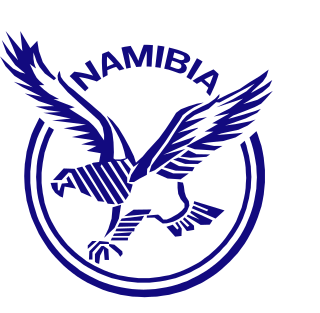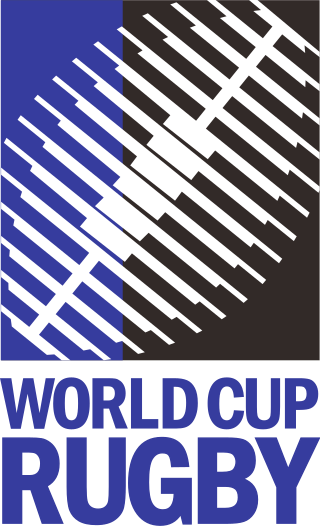
The 1999 Rugby World Cup was the fourth Rugby World Cup, the quadrennial international rugby union championship, the first World Cup to be held in the sport's professional era.

The Namibia national rugby union team represents Namibia in men's international rugby union competitions nicknamed the Welwitschias, are a tier-two nation in the World Rugby tier system, and have participated in the six Rugby World Cup competitions since their first appearance in 1999. They are governed by the Namibia Rugby Union.

The 1987 Rugby World Cup was the first Rugby World Cup. It was co-hosted by New Zealand and Australia – New Zealand hosted 21 matches while Australia hosted 11 matches. The tournament was won by New Zealand, who were the strong favourites and won all their matches comfortably. New Zealand defeated France 29–9 in the final at Eden Park in Auckland. The New Zealand team was captained by David Kirk and included such rugby greats as Sean Fitzpatrick, John Kirwan, Grant Fox and Michael Jones. Wales finished third, and Australia fourth, after conceding crucial tries in the dying seconds of both their semi-final against France and the third-place play-off against Wales.

The 1995 Rugby World Cup was the third Rugby World Cup. It was hosted and won by South Africa, and was the first Rugby World Cup in which every match was held in one country.
The 2006 FIFA World Cup qualification competition was a series of tournaments organised by the six FIFA confederations. Each confederation – the AFC (Asia), CAF (Africa), CONCACAF, CONMEBOL, OFC (Oceania), and UEFA (Europe) – was allocated a certain number of the 32 places at the tournament. A total of 197 teams entered the qualification process for the 2006 FIFA World Cup. In 2001 FIFA ended automatic qualification of the reigning champion, so that 2002 champions Brazil became first to participate in the qualifying tournament. The hosts (Germany) retained their automatic spot.
The Ivory Coast national rugby union team, nicknamed Les Éléphants, participates in the annual Africa Cup and are considered a third tier rugby team.
The 1995 Rugby World Cup was preceded by a qualifying campaign in which forty-five nations were entered. 16 teams participated in the finals tournament in South Africa, seven of which came through qualifying matches. Eight were granted automatic entry as they were quarter-finalists at the 1991 Rugby World Cup, and South Africa qualified automatically as hosts.
The qualification process for the 2003 Rugby World Cup began during the pool stages of the 1999 tournament in Wales, during which the quarterfinalists were awarded automatic qualification for the 2003 event. A further twelve teams qualified through regional tournaments and the repechage process.

The United States national rugby union team has played in all but one Rugby World Cup since the inaugural tournament in 1987. The USA is the second strongest national rugby side in North America, and the third strongest in the Americas after Argentina and Canada.
The 2012 Africa Cup was the twelfth edition of the Africa Cup, an annual international rugby union tournament for African nations organised by the Confederation of African Rugby (CAR). The tournaments between 2012 and 2014 will also serve as qualifiers for the 2015 Rugby World Cup.
For the 1995 Rugby World Cup qualifiers, the European Federation was allocated three places in the final tournament. This was in addition to the four places granted to England, France, Ireland and Scotland based on their results from 1991.
For the 1995 Rugby World Cup in South Africa, the Oceania teams from Australia, New Zealand and Western Samoa were granted automatic entry due to reaching the quarter-final stages of the 1991 tournament.
For the 1995 Rugby World Cup in South Africa, the Americas were allocated one direct qualifying place in addition to the automatic qualification of Canada which was granted a place due to reaching the quarter-final stages of the 1991 tournament.
The Confederation of African Rugby was allotted one place in the 1999 Rugby World Cup by direct qualification and one place in the repechage tournament. This was in addition to the automatic qualifying place granted to South Africa as champions of the 1995 tournament.
Qualifying for the 2019 Rugby World Cup for Africa Rugby began in June 2016, with 14 teams competing. On 18 August 2018, Namibia qualified for the World Cup by winning the 2018 Rugby Africa Gold Cup, defeating Kenya, who finished second and advanced to the repechage tournament.
The qualification process of men's teams for the 2001 Rugby World Cup Sevens. Automatic qualification was extended to the host and the eight quarterfinalists of the previous World Cup. The remaining spots were contested in each of the five regions' respective tournaments.
Twelve teams qualified for men's rugby sevens at the 2020 Summer Olympics. Japan automatically qualified as host, with the top four teams of the 2018–19 World Rugby Sevens Series securing their spots. Afterwards, qualification was determined with each of the six continental confederations determining a representative, and the remaining qualification spot determined through an international sevens tournament.
The 2019 Africa Men's Sevens was a rugby sevens tournament held in Johannesburg on 8–9 November 2019. It was the seventh championship in Africa Men's Sevens, a series that began in 2013.

The qualification process for the 2021 Rugby World Cup began on 9 August 2019 with 12 teams qualifying to the tournament which will be held in New Zealand. The 2021 Rugby World Cup was postponed by one year in March 2021 to 2022 due to the COVID-19 pandemic.
The 2021–22 Rugby Africa Cup, which doubled as Qualifying for the 2023 Rugby World Cup for Africa began in June 2021, where teams competed for one direct qualification spot into the final World Cup tournament and for one place in the final Qualification Tournament.
![]() Namibia and
Namibia and ![]() Zimbabwe Qualified for the Round 2
Zimbabwe Qualified for the Round 2![]() Ivory Coast and
Ivory Coast and ![]() Morocco Qualified for the Round 2
Morocco Qualified for the Round 2![]() Ivory Coast qualified for the 1995 Rugby World Cup
Ivory Coast qualified for the 1995 Rugby World Cup 




